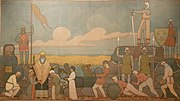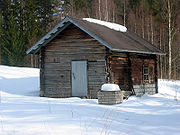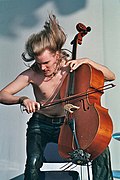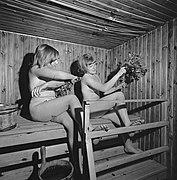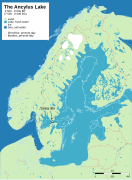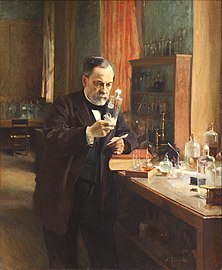

Finland, officially the Republic of Finland, is a Nordic country in Northern Europe. It borders Sweden to the northwest, Norway to the north, and Russia to the east, with the Gulf of Bothnia to the west and the Gulf of Finland to the south, opposite Estonia. Finland covers a total area of 338,145 square kilometres (130,559 sq mi), including a land area of 303,815 square kilometres (117,304 sq mi), and has a population of 5.6 million. Helsinki is the capital and largest city. The vast majority of the population are ethnic Finns. The official languages are Finnish and Swedish; 84.9 percent of the population speak the first as their mother tongue and 5.1 percent the latter. Finland's climate varies from humid continental in the south to boreal in the north. The land cover is predominantly boreal forest biome, with more than 180,000 recorded lakes.
Finland was first settled around 9000 BC after the last Ice Age. During the Stone Age, various cultures emerged, distinguished by different styles of ceramics. The Bronze Age and Iron Ages were marked by contacts with other cultures in Fennoscandia and the Baltic region. From the late 13th century, Finland became part of Sweden as a result of the Northern Crusades. In 1809, as a result of the Finnish War, Finland was captured from Sweden and became an autonomous grand duchy within the Russian Empire. During this period, Finnish art flourished and the independence movement began to take hold. Finland became the first territory in Europe to grant universal suffrage in 1906, and the first in the world to give all adult citizens the right to run for public office. Following the Russian Revolution of 1917, Finland declared its independence. A civil war was fought in Finland the following year, with the Whites emerging victorious. Finland's status as a republic was confirmed in 1919. During World War II, Finland fought against the Soviet Union in the Winter War and the Continuation War, and later against Nazi Germany in the Lapland War. As a result, it lost parts of its territory but retained its independence and democracy. (Full article...)

Hilja Elisabet Riipinen (30 October 1883 – 18 January 1966, née Miklin, later Metsäpolku) was a Finnish politician involved with the nationalist and anti-communist Lapua Movement and Patriotic People's Movement (IKL). She was a member of parliament between 1930 and 1939, first elected from the electoral list of the National Coalition Party, but she defected to the Patriotic People's Movement after it was formed as a political party in 1933.
Being uncompromising in her general address, one of the most vehemently anti-communist IKL parliamentarians and her support for radical elements in the movement proved troublesome for her relations outside of the party. This earned her the nickname Hurja-Hilja, or "Wild Hilja". (Full article...)

- ... that Turku remained the largest city in Finland after three quarters of it burned down?
- ... that Charlotte Haining was an International Jury Member for the selection of Finland's 2020 Eurovision Song Contest entry?
- ... that Finnish linguist Eeva Leinonen was one of four women to be inaugurated as heads of Irish universities in 2021, the others being Maggie Cusack, Linda Doyle and Kerstin Mey?
- ... that the Finnish 7th Division was formed in 1940 by renumbering another unit to make it appear to the Soviets that it had been replaced with fresh troops?
- ... that the 1972 Finnish film The Sheep Eaters gathered more than a million viewers opposite the 1975 Ice Hockey World Championships match between Finland and the Soviet Union?
- ... that records of transgender people in Finland stretch back to the 19th century?

You are invited to participate in Finland WikiProject, a WikiProject dedicated to developing and improving articles about Finland.
- ...that when completed in 1967, MS Finlandia was the largest ferry in the world?
- ...that the Pysähdy ajoissa - Stanna i tid ("Stop in time") traffic campaign was the result of the public response to a road death of a nine-year-old girl in Finland?
- ...that the Finnish Association of Graduate Engineers has been in charge of publishing Finland's ethical guidelines on engineering for over 40 years?
- ...that Penedo, a small town in Brazil was colonized by immigrants from Finland?
- ...that the Wärtsilä Turku shipyard in Finland built five state-of-the-art cruiseferries for the Black Sea Shipping Company, Soviet Union, in 1975-1976?

Jean Sibelius (/sɪˈbeɪliəs/; Finland Swedish: [siˈbeːliʉs] ⓘ; born Johan Julius Christian Sibelius; 8 December 1865 – 20 September 1957) was a Finnish composer of the late Romantic and early modern periods. He is widely regarded as his country's greatest composer, and his music is often credited with having helped Finland develop a stronger national identity when the country was struggling from several attempts at Russification in the late 19th century.
The core of his oeuvre is his set of seven symphonies, which, like his other major works, are regularly performed and recorded in Finland and countries around the world. His other best-known compositions are Finlandia, the Karelia Suite, Valse triste, the Violin Concerto, the choral symphony Kullervo, and The Swan of Tuonela (from the Lemminkäinen Suite). His other works include pieces inspired by nature, Nordic mythology, and the Finnish national epic, the Kalevala; over a hundred songs for voice and piano; incidental music for numerous plays; the one-act opera The Maiden in the Tower; chamber music, piano music, Masonic ritual music, and 21 publications of choral music. (Full article...)
- 25 December 2024 –
- HVDC submarine power cable Estlink 2, which connects the power grids of Estonia and Finland, suffers an unexplained outage with Finnish Prime Minister Petteri Orpo stating that an investigation into the incident is underway. (AP)
- 18 November 2024 – 2024 Baltic Sea submarine cable disruptions
- The C-Lion1 submarine communications cable across the Baltic Sea between Finland and Germany is damaged in what German officials suspect is sabotage. (The Guardian)
- 9 September 2024 –
- Finnish-Canadian sportswear mogul Peter Nygård is sentenced to 11 years in prison for sexual assault. (CBC News)
- 14 August 2024 – Organized crime in Sweden
- Sweden, Denmark, Norway, and Finland form an international police hub in Stockholm to prevent escalating Swedish gang activity and criminal networks from spreading to other Nordic countries. (Reuters)
- 26 July 2024 – Finland–Russia relations
- Finland reports that a Russian Navy Baltic Sea fleet vessel trespassed on Finnish territorial waters in the eastern Gulf of Finland. (Reuters)
- 12 July 2024 – Finland–Russia relations, Russian emigration during the Russian invasion of Ukraine
- The Parliament of Finland passes a law allowing border guards to restrict trafficked asylum seekers from crossing the Finland–Russia border. (CNN)
Northern Europe
Other countries
- Add the {{Portal|Finland}} template to existing See also sections of Finland-related articles.
- Tag the talk pages of Finland-related articles with the {{WikiProject Finland}} template. (Tip: Use PetScan to find articles not tagged yet by replacing the category "Finnish films" with another category and adjust "Depth" if needed. This tool is helpful for tagging. See also the list of pages not tagged yet.)
- Rate unassessed and unknown-importance articles according to the guidelines. (This tool is helpful for doing these.)
- Translate a Finnish-language article into English.
- Expand a stub into a full article.
- Help with the articles needing attention (watch) and cleanup.
- Create a requested article (watch).
- Support fresh articles (watch).
- Patrol the recent changes.
- Add the following pages to your watchlist:
The following Wikimedia Foundation sister projects provide more on this subject:
-
Commons
Free media repository -
Wikibooks
Free textbooks and manuals -
Wikidata
Free knowledge base -
Wikinews
Free-content news -
Wikiquote
Collection of quotations -
Wikisource
Free-content library -
Wikiversity
Free learning tools -
Wikivoyage
Free travel guide -
Wiktionary
Dictionary and thesaurus












































